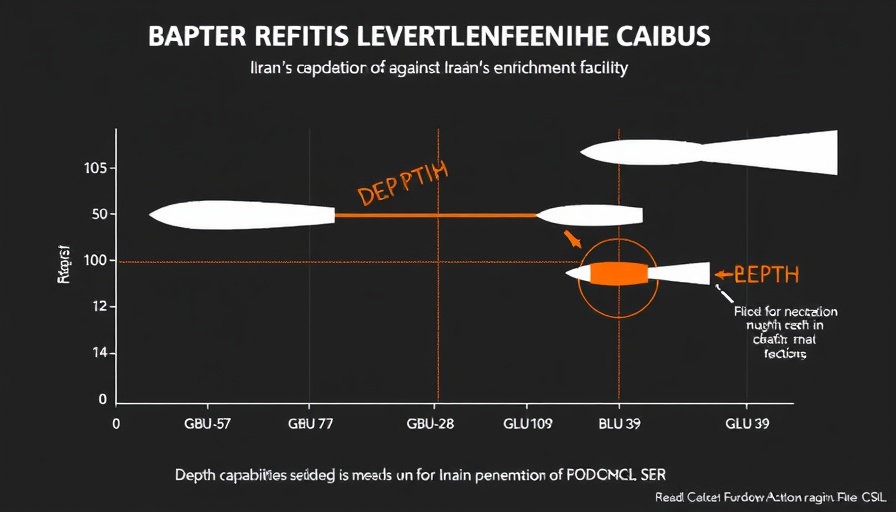
The U.S. and Israel: A Growing Military Alliance
In the complex world of international relations, alliances are often forged in the face of mutual threats. The United States and Israel, both deeply concerned about Iran's nuclear ambitions, are contemplating an unprecedented military collaboration. The backdrop of this alliance is underscored by the existence of a formidable weapon in the U.S. arsenal—a 30,000-pound bomb known as the GBU-57 E/B Massive Ordnance Penetrator, or "MOP." This precision-guided bomb is designed specifically for targeting heavily protected facilities, making it a central piece in the strategy against Iran's fortified nuclear sites, such as the Fordow facility.
Historical Context: The Fordow Facility
The Fordow facility, hidden deep within a mountain, represents a significant challenge for both Israeli and U.S. military planners. Established in secrecy, it has become a focal point in Iran's nuclear program. Its depth and construction make it resistant to conventional weapons, prompting discussions about the necessity for advanced ordnance like the MOP. Historical precedents, such as Israel's successful use of airstrikes against Osirak in Iraq in 1981, illustrate their proactive approach to nuclear proliferation. However, the stakes are higher now, as Iran's capabilities have evolved, amplifying the urgency for a decisive operation.
The MOP: A New Era in Warfare?
What makes the MOP particularly compelling is its design purpose. According to the U.S. Air Force, it was created to traverse and obliterate hard and deeply buried targets (HDBTs). With the potential use of B-2 Spirit stealth bombers to deliver this bomb, the operational combination of stealth technology and the MOP could redefine military engagement strategies. This raises pivotal questions about the moral and strategic implications of deploying such a powerful weapon, particularly in a region rife with geopolitical tensions.
Future Predictions: Implications of U.S. Involvement
The potential U.S. involvement in a military operation against Iran using the MOP not only highlights a tactical shift but also suggests broader implications for international relations and global security. Should the U.S. assist in a bombing campaign, it would signal a departure from decades of indirect diplomacy and sanctions aimed at curtailing Iran's nuclear aspirations. Military historian Robert Pape noted this operation's unprecedented nature, emphasizing that delivering two bombs to achieve the desired destruction level is a calculated risk that U.S. military planners must approach with caution.
Counterarguments: Concerns Over Escalation
While some advocate for military action, critics point to the dangers inherent in escalating conflict with Iran. The ramifications could extend beyond the immediate military objectives, potentially destabilizing the region and provoking retaliatory strikes across the Gulf. Diplomatic experts suggest that emphasizing pressure tactics while maintaining dialogue may yield a more sustainable resolution than military strikes. This perspective underlines the delicate nature of international diplomacy, where a single misstep could lead to broader conflict.
The Technological Edge: Innovations in Warfare
In today’s conflict landscape, technology is the game-changer. The MOP represents the pinnacle of precision bombing technology, showcasing advancements made since earlier conflicts. The integration of artificial intelligence and data analytics into military operations allows for improved targeting accuracy and operational efficiency. Such advancements not only shift the dynamics of warfare but also raise ethical considerations regarding the future of combat and civilian collateral damage.
Making Sense of Civilian Perspectives
As discussions unfold regarding military intervention, it is essential to consider civilian sentiments in both the U.S. and Israel about engaging in enhanced military activities. Many citizens express concern about the potential loss of life and the moral implications of warfare, particularly in a region with a history of deep-rooted conflict. Public opinion plays a crucial role in shaping the decisions of policymakers and could act as a check on aggressive military strategies.
Conclusion: Taking Action In Times of Uncertainty
As tensions rise and discussions about military collaborations intensify, the involvement of the U.S. in Israel's operations against Iran marks a critical juncture in global military strategy. It is a scenario that requires meticulous consideration of not just military objectives, but the broader consequences for regional and international peace. The time for thoughtful dialogue and strategic foresight is now, ensuring that decisions reflect not only the might of military power but also the profound value of diplomacy.
 Add Row
Add Row  Add
Add 




Write A Comment